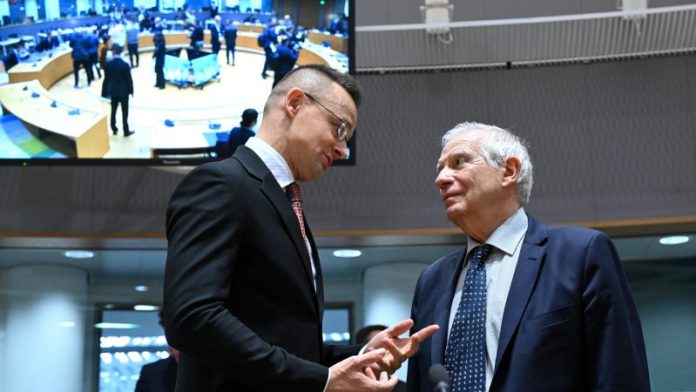EU foreign ministers did not shy away from expressing their irritation over Hungary’s long veto of military aid to Ukraine on Monday.
Gabrielius Landsbergis of Lithuania said:
This has gone very, very far.
The blockade began a year ago when Budapest refused to approve a 500 million euro tranche under the European Peace Facility (EPF), an extra-budgetary instrument that allows member states to receive partial compensation for military equipment they send to Kyiv.
The dispute, which has caused much frustration among EU diplomats, escalated after member states reached a hard-fought deal in March to top up the EPF with an additional 5 billion euros to be distributed by the end of the year.
Hungary’s veto of the €500 million package affected two other packages of the same size, totalling €1.5 billion. The impasse also means that the next €5 billion cannot be disbursed, creating widespread obstacles to EU aid. As a result, countries have switched to bilateral donations, bypassing Brussels.
Frustration is mounting
Belgium’s representative Hajja Labib said after arriving at the meeting:
We cannot accept that a single country, which also signed in favour of this amount a few months ago during a summit between heads of state, is now blocking this crucial aid for Ukraine. We must absolutely assume our responsibilities and do what is necessary to help Ukraine militarily.
Her Estonian counterpart Margus Tsahkna claimed that “every time” ministers travelled to Brussels, they faced Hungary’s veto on “very important initiatives”. Tsahkna also added:
We have to take down the (blockage) in the meaning that we have to convince Hungary. But it’s crucial that Ukraine needs this kind of support.
Latvia’s representative Baiba Braže said EU political unity should lead to “real, practical results” and complained of “a number of issues” that remain pending in the council. She noted:
We expect those member states to relent.
Meanwhile, Lithuania’s Landsbergis gave the harshest assessment, condemning Hungary’s stance as a “systematic approach to any attempt by the EU to play any meaningful role in international affairs”. The minister cited Ukraine’s EU accession process and Georgia’s “foreign influence” law as examples in which Budapest has tried to thwart collective decisions.
Diplomats roll their eyes at Hungary’s reasoning, which they regard as unreasonable. They now fear that obstruction by the EPF could derail a new agreement on the use of extraordinary revenues generated from Russia’s immobilised assets. The project could raise between €2.5bn and €3bn annually, 90 per cent of which could go for supplying arms and ammunition to Ukraine.
While Budapest has not blocked a legal deal on the immobilised assets, it can still use its veto power to prevent the release of new money.
At the end of Monday’s meeting, EU foreign policy chief Josep Borrell said any move should be “proportionate to the issue at stake” and urged Hungary to break the deadlock that has led to “seven legal texts awaiting approval”. He noted that Budapest had secured an opt-out clause to ensure that its national contributions would not fund any military equipment sent to Kyiv. EU chief also said:
We cannot let the European Union’s military support for Ukraine be taken hostage by other decisions which have nothing to do with this specific issue.
